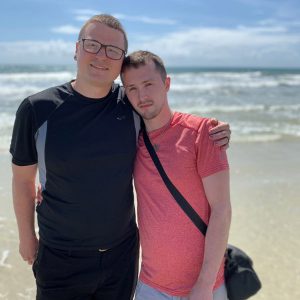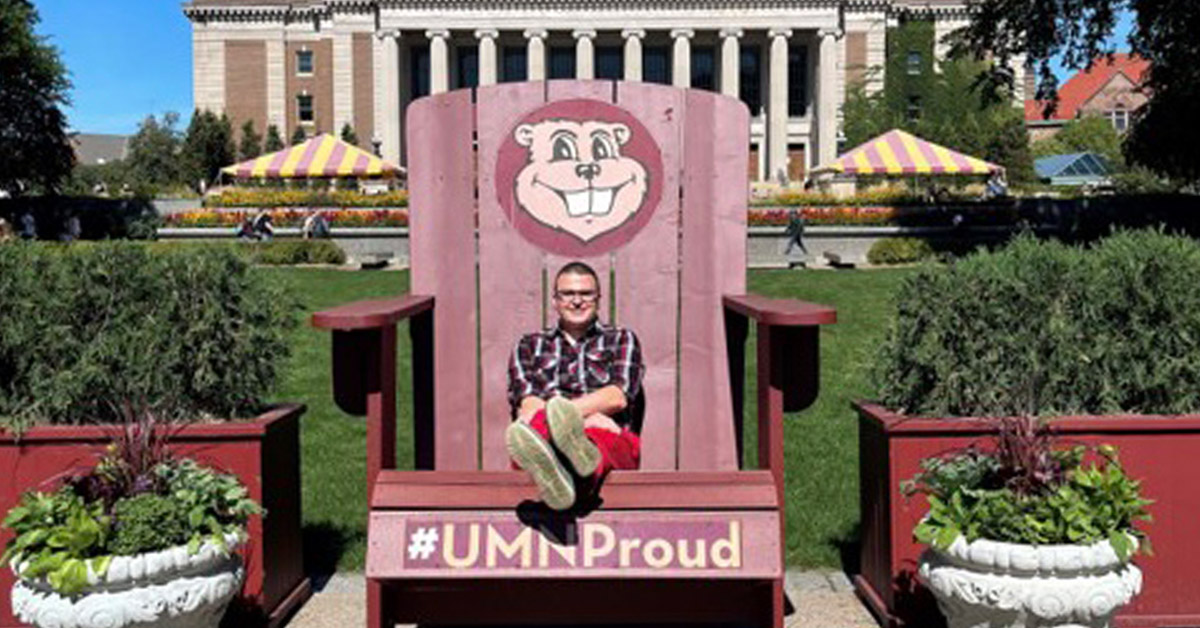"With addiction, the window of opportunity for helping someone get sober is really small and so it’s super important to respond accordingly. Dead people don’t recover, so it’s all about keeping people alive and healthy."
First, I’d like to know a little bit about you as a person. Where did you grow up? Where did you attend undergrad and what was your degree/area of study? [Eric] I grew up in Apple Valley, MN, and for undergrad I went to Minnesota State Mankato. I received a BS in alcohol and drug studies. I chose that degree so that I could become a licensed drug and alcohol abuse counselor. I also minored in corrections because I was interested in the correlation between substance abuse and criminality. I currently work as a counselor at a prison in Shakopee, MN.
How did you become interested in public health? [Eric] While working in the substance abuse field, I’ve been introduced to public health work and have worked with clients who were actively using. My role has been to supply them with harm reduction tools and resources and it’s really showed me how public health is tied to addiction and drug abuse. I realized that I could do the most good with an MPH degree because I would be able to create plans and programs to support these people who desperately need help. I myself am a person in recovery and I have known many people who have overdosed and died.
What specific issue, problem, or area of research in public health do you care the most about and why? [Eric] We are in a public health emergency with opioid use disorder, specifically overdoses. I’m very passionate about that and harm reduction seems to do the most good with keeping people alive. The philosophy with harm reduction is to work directly with the people who are using substances to keep them as healthy as possible, and if they want, to get them on a path to sobriety and then onto recovery. With addiction, the window of opportunity for helping someone get sober is really small and so it’s super important to respond accordingly. Dead people don’t recover, so it’s all about keeping people alive and healthy.
How would you like to help address this issue? [Eric] Currently, I work in a treatment setting, at the prison in Shakopee, MN. We help get women out of prison up to four years early through an early release program that includes substance use disorder treatment. This process includes setting them up with what we call “medication assisted treatment.” This is mainly what we do for people with opioid use disorder. We’ll provide them with suboxone or vivitrol so that they can stay alive and healthy when they get out. We also do training for how to properly recognize an overdose and how to use naloxone/narcan. I think that everyone should carry naloxone so that they can help anyone in need.
Are you currently involved in any public health research or professional work? [Eric] I started a podcast where I interview experts in the opioid use disorder (OUD) field to discuss ways we can help people who are using and keep them healthy enough so that they can find their way to recovery. The podcast is called Stigma’s Toll: A Podcast Series to Reduce the Stigma of Opioid Use Disorder Through Education. Starting the podcast was a long process and one of the biggest hurdles was finding experts willing to talk with me. My guests have been great at educating me and our listeners on OUD and harm reduction best practices. The goal of the podcast is to educate as many people as possible because education regarding substance use reduces the stigma attached to it. Research has shown that the stigma has delayed people seeking help and can make their addictions worse. If we can reduce that stigma, they will be more likely to get help sooner and find their path to recovery.

Why did you choose to come to the U of M School of Public Health? [Eric] There were a few reasons why. When I first started searching MPH programs, I was looking at the list of top 10 schools and Minnesota was on that list. Then, I learned that they have executive programs which allow you to continue working and that really sold it for me because I love my job and I wanted to continue working.
What are the reasons why you chose your program? What do you like about it? [Eric] The main reason I chose the Executive Public Health Administration and Policy MPH program was because of the ability to work and go to school simultaneously. The people in my cohort bring experience from many different fields and there’s also a big emphasis on social justice. I can tell that there are a lot of skills I’m learning that I will be able to apply to work in the future.
What has been your favorite class so far? [Eric] It’s hard to choose a favorite class because they have all been so educational but I would say that Continuous Quality Improvement with James McCarthy (PubH 6765) was my favorite because it teaches you different ways to find solutions to public health problems and I feel like I can use those skills right away.
What are you hoping to do after you finish your degree? [Eric] My ultimate goal would be to start a safe consumption site/overdose prevention site. These are sites where people who are using can bring their drugs to the facility and use the drugs there with clean supplies and be in a supervised setting, so that in case of an overdose they can get the help they need. These are evidence-based facilities that can dramatically reduce overdose deaths.
What do you like about being in Minnesota? [Eric] The best thing about Minnesota is the nature. We have so many parks. Even in the Twin Cities area, we have lots of mountain biking trails along and tons of trails along the rivers. It can be beautiful, even in the winter.

